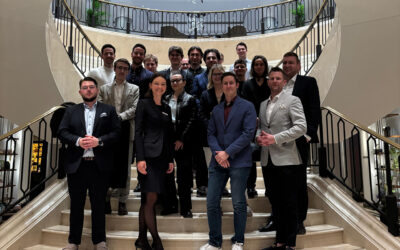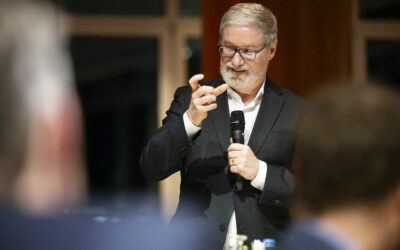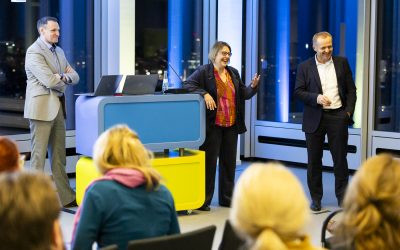"We quickly found each other"
VBKI SPIEGEL - Preview: Double interview with the heads of government of the capital region
HOW DO KAI WEGNER AND DR. DIETMAR WOIDKE ENVISION THE FUTURE OF THE CAPITAL REGION? WE ASKED THE TWO HEADS OF STATE.
Questions: Sebastian Thomas
Mr. Wegner, you grew up in Spandau-Hakenfelde, in West Berlin. Brandenburg was very far away back then. Can you still remember your first visit to Brandenburg? What was it like?
I was already in Brandenburg as a small child, it just wasn't called that back then. When my parents took me on vacation, the transit highway ran through what is now Brandenburg. It was a different country for me, where my parents didn't want to stop, not even at the transit rest stop. Today, it's remarkable how well Brandenburg has developed. We used to be separated by border fences and watchtowers, but today we have a shared metropolitan region that is growing ever closer together. Berlin without Brandenburg is no longer conceivable and vice versa.
Dr. Woidke, you grew up near Cottbus, in the GDR. When did you first get an impression of West Berlin?
Until November 9, 1989, impressions were only available through stories and the media, especially RIAS, the radio station in the American sector. On that day, a Thursday, the Berlin Wall came down. I lived in East Berlin and, like thousands of others, walked across Bornholmer Strasse to the West - to Wedding. Everywhere the historic exclamation "madness". Tingling, excitement, joy everywhere. But despite all the joy, one question kept us busy: What are the Russians doing?
For the first time in more than 20 years, the heads of Berlin and Brandenburg belong to different parties. To what extent does this make cross-state cooperation more complicated?
Wegner: Not at all, perhaps even the opposite is the case. If I may put it this way: Dietmar Woidke and I get on extremely well and party political considerations play no role for us when it comes to our two states and the interests of our citizens. We use our different networks for our common goals, one in the direction of the SPD-led states, the other in the direction of the CDU-led states. Even in the Bundesrat or in the Conference of Minister Presidents, it is always noticeable that it is hardly about political colors, but about common interests.
Woidke: We quickly came together in terms of content and on a personal level. In recent years, Berlin and Brandenburg have succeeded in creating a closer and more trusting cooperation than ever before. This is what is needed and we will continue to do so - neither state nor party boundaries play a role in this.
Berlin and Brandenburg are unequal neighbors, the long-prepared state merger of 1996 failed due to Brandenburg's "no" (and the Berliners in the east of the city were not enthusiastic about the idea either): What distinguishes the capital region today from a mere community of convenience?
Woidke: We are much more than a community of convenience. Berlin has learned that Brandenburg does not end at the autobahn ring and is more than just Berlin's pretty front garden. Looking back, perhaps it was a good thing that the merger failed. Berlin and Brandenburg were able to develop their own strengths, which we now cleverly combine as the capital region. Today, we cooperate where it really makes sense for the people of Berlin and Brandenburg, for example when it comes to an even better rail infrastructure or joint spatial planning. We always have Berlin and Brandenburg in their entirety in mind: from Prignitz via Alexanderplatz to Lusatia, from Uckermark via Wittenbergplatz to Fläming. A simple example: Berlin and Brandenburg have each invested 50 million euros in the northern extension of the important Berlin-Angermünde-Stettin rail link, although this should actually have been done by the federal government. But without us, nothing would have progressed.
"We are much more than a community of convenience. Berlin has learned that Brandenburg does not end at the autobahn ring and is more than just Berlin's pretty front garden.
Dr. Dietmar Woidke
Wegner: The metropolitan region, which we see ourselves as, will grow together even without a state merger. People are already taking care of that all by themselves. Just think of the commuter flows in both directions. Berliners, when they are not commuting to the neighboring state or even living in the bacon belt, enjoy their free time on excursions in Brandenburg. Day tourists are an important economic factor there. The film industry has been showing us how it's done for a long time: the film city of Berlin, the Berlinale and Babelsberg with the film academy, the studios and the rbb location - it all belongs together. Or think of the joint airport. I am convinced that a naturalness of living together and solidarity has developed and will continue to develop in people's minds.
Politically separate, economically closely intertwined: How do you both want to maximize the potential of the booming capital region as a business location? Can the growth in the bacon belt radiate into the areas far from Berlin, keyword "innovation corridors"? What role should the planned further development of the Berlin-Brandenburg innovation strategy play in this?
Wegner: Berlin and Brandenburg complement each other perfectly. Among other things, Berlin brings international appeal, while Brandenburg has a large amount of potential space. We combine the locational advantages of both partners. Our joint "innoBB25 innovation strategy" is the catalyst for the further development of our economic region. Climate protection is particularly important to us. Keywords such as settlement star, innovation corridors and innovation strategy are all part of our plans. These are topics that we also discuss at joint cabinet meetings because they are central to our cooperation. I would like to highlight the Berlin-Lausitz innovation axis because it is intended as a pilot project for other axes. An important factor that we Berliners bring to the collaboration is the potential of our start-ups. Alongside London and Paris, our city is the start-up capital of Europe in terms of start-up capital, start-ups and popularity among companies. Ultimately, we want to ensure that our citizens are also enthusiastic about innovation. After all, it is fascinating to see what is possible today, right here at home.
Woidke: My goal is for both states as a whole to become one of the leading business and science locations in Germany and Europe as a capital region. That is why I am also advocating closer integration of economic development for the entire region. We want to combine strengths. In Brandenburg itself, in the regions, but also the strengths of the federal states, including with innovation corridors such as - as Kai Wegner has already mentioned - from the Adlershof Science Park via Königs Wusterhausen and Lübben to the future Lausitz Science Park in Cottbus. Or from Berlin to Wittenberge. We are improving the competitiveness of the capital region by, for example, tackling the acquisition of skilled workers, creating attractive medical services or promoting the use of hydrogen. The good cooperation and the experience gained from the Berlin-Brandenburg innovation strategy were a very important starting point for this. Our close ties help us to play to both strengths: the diversity of a vibrant city and the attractiveness of a rural area. The establishment of the Tesla car factory in Grünheide in the Mark Brandenburg is an example of this, as the proximity to Berlin was - among many others - an important factor. Our region is perceived worldwide as a shared region.
"Alongside London and Paris, our city is the start-up capital of Europe in terms of start-up capital, start-ups and popularity among companies."
Kai Wegner
It is not only economic and settlement policy that needs to be considered together. The same applies to urban development, transport, energy, recruiting skilled workers and climate protection. In your opinion, where is the greatest need for action in cross-border cooperation? What is at the top of your list of priorities?
Woidke: The five most important issues: a strong economy, housing construction with affordable rents, expansion of rail transport, securing skilled workers with a stable training market as well as climate protection and water management. And above all of this, of course, is our common understanding that a successful future for our shared region can only succeed in a strong constitutional state and with democratic structures that remain stable. In this respect, Berlin and Brandenburg will continue to stand united against all forms of extremism.
Wegner: Our priorities in the partnership with Brandenburg include water management, energy, mobility and digitalization in particular. With these tasks, it is crystal clear that we need to plan together and across state borders in order to develop the best possible results for both sides in the interests of the citizens. Berlin and Brandenburg agreed on concrete cooperation for joint water management at the last joint cabinet meeting. We also want an agreement on a "joint energy region". This brings us directly to the topic of climate protection, as wind and solar energy are important factors in energy generation in our region.
Where do you see the greatest risks for the joint location? To what extent could the AfD's high poll ratings weaken the region in international competition?
Woidke: Open-mindedness and tolerance are the basis of our society and of further positive development. Let's take the example of Rolls-Royce in Dahlewitz. Colleagues from 60 nations work there. This means that right-wing extremism and xenophobia are the biggest problem we have. As a society and as a location. Brandenburg is only at the beginning of a success story. There is only one way to stop this upswing: the loss of an open society. In this respect, support for a largely right-wing extremist party is a huge location risk and therefore also the greatest risk to prosperity and good prospects in the regions.
Wegner: Xenophobia harms our entire region. We must not allow the impression to be created that our country does not welcome the people we urgently need. International competition and pressure are high. The people everyone is courting will simply go elsewhere. It is clear that those who incite hatred against minorities are doing us all massive harm.
Berlin and Brandenburg are among the driest regions in Germany, and water scarcity is increasingly becoming a limiting factor in the competition between locations. What can be done to counteract this?
Woidke: Fortunately, it has rained well so far this summer, but that can change quickly. There are no quick answers to such a complex issue. What is clear is that a functioning water balance is the basis for the future development of the capital region. That is why we are currently working on a joint water management system to enable a holistic view of the water balance in the metropolitan region. Of course, the Spree plays a crucial role in this with regard to structural change and the coal phase-out in Lusatia. It is already clear that the solution will be a mixture of savings, efficient use of resources and better distribution. Overall, we will also focus more on the issue of wastewater disposal and wastewater treatment in order to ensure a functioning recycling system here too. The aim must be to keep as much rainwater as possible in the region and not let it run off.
Wegner: We used to have an abundance of water in Berlin, and there was even talk that consumption was too low. Although there are still problems with high groundwater levels in parts of Berlin, overall the times of abundance are over. The water companies are now campaigning for this raw material and foodstuff to be used sparingly because it doesn't just come out of the tap. And the metropolis has already developed its own answers to this issue: We must learn to use our water carefully and consciously. Berlin must become a sponge city. This means that we have to take care of rainwater and make better use of wastewater. In times of climate change, this is also part of public services. In addition, this topic shows particularly clearly how much both countries depend on cooperation. In terms of water management, we are by nature a joint region. That is why there are already joint institutions such as the "Berlin-Brandenburg Drinking Water Supply Initiative", and there are regular, numerous meetings and consultations between the two states at various levels.
Mr. Wegner, your inaugural visit to Potsdam started late - the journey to the Brandenburg capital took longer than planned due to the difficult traffic situation. What measures will you both take to make cross-border commuting easier?
Wegner: We are relying on rail. We need to expand the rail network and increase frequency on existing routes so that more people can travel faster and more comfortably. We talked about this at our transport summit. We need to hold Deutsche Bahn accountable, and it is moving in the right direction. Our two states have also launched a joint initiative at the Conference of Eastern German Minister Presidents, which is supported by all the other eastern German states. We want to speed up the construction and planning of rail infrastructure. On the one hand, we want to shorten court proceedings by reducing the number of instances. On the other hand, we want the expansion, new construction and replacement of rail infrastructure to be recognized as a fundamentally overriding public interest in terms of climate protection and services of general interest. We need the right offers so that even more commuters can switch from car to train. Parking spaces for park-and-ride are therefore essential. We also need to work together to provide bicycle connections to Berlin.
Role reversal at the end: Dr. Woidke, imagine you are the Governing Mayor of Berlin. What would be the three most important measures to strengthen cross-border cooperation?
Woidke: I was delighted to read in the Berlin coalition agreement about the great importance of cooperation between Berlin and Brandenburg. It sets ambitious goals for our states. These are the issues that I would focus on as the governing coalition.
And now you, dear Mr. Wegner: you are Minister President of Brandenburg. What three measures would you take to further strengthen ties with Berlin?
Wegner: I would take Dietmar Woidke as a role model: always listen to the Berlin partners, understand their point of view and, if necessary, simply pick up the phone yourself.
Gentlemen, thank you very much for the interview!
You might also be interested in
"A concierge knows everything"
VBKI Young Professionals meet the head concierge of the Ritz Carlton, Berlin
CEOs for Berlin meet Prof. Lars-Hendrik Röller, Ph.D.
CEOs for Berlin meet Prof. Lars-Hendrik Röller, Ph.D. Text: Jörg Ritter | Coordinator CEOs for Berlin On February 27, almost 40 CEOs came to the...
A start-up with 130 years of experience
KI-Kompass of the VBKI - this time with the KIRA project of the German Pension Insurance, among others









